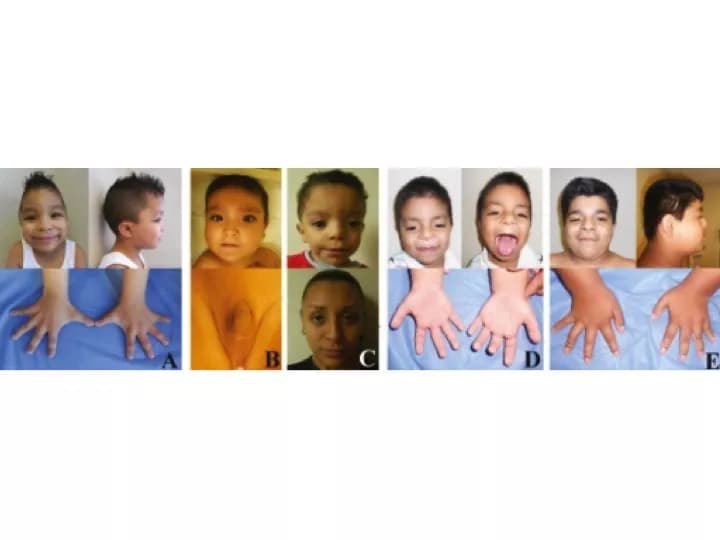What are the other Names for this Condition? (Also known as/Synonyms)
- Aarskog Disease
- Aarskoga's Facial-Digital-Genital Syndrome
- Aarskog-Scott Syndrome
What is Aarskog Syndrome? (Definition/Background Information)
- Aarskog Syndrome (AAS) is a very rare X-linked inherited genetic disorder. The term X-linked implies that the condition is inherited on the sex chromosome (X or Y chromosome)
- Individuals diagnosed with this condition show skeletal abnormalities, mild to moderate mental abnormalities, and abnormal morphological (related to form) features of body structures
- Aarskog Syndrome is hard to notice based on the morphological defects, until a child reaches the age of 3 years
Who gets Aarskog Syndrome? (Age and Sex Distribution)
- Aarskog Syndrome is an inherited disorder that can run in families, mainly affecting males; though, it has been reported in females too
- When AAS is diagnosed in females, the symptoms are generally milder, in comparison to males
What are the Risk Factors for Aarskog Syndrome? (Predisposing Factors)
Aarskog Syndrome is an inherited disorder; a family history of the Aarskog Syndrome increases the risk.
It is important to note that having a risk factor does not mean that one will get the condition. A risk factor increases ones chances of getting a condition compared to an individual without the risk factors. Some risk factors are more important than others.
Also, not having a risk factor does not mean that an individual will not get the condition. It is always important to discuss the effect of risk factors with your healthcare provider.
What are the Causes of Aarskog Syndrome? (Etiology)
Aarskog Syndrome is an X-linked inherited disorder, caused by a genetic mutation in a gene called FGDY1 (Fascial Genital Dysplasia 1).
What are the Signs and Symptoms of Aarskog Syndrome?
There are variety of signs and symptoms that are characteristic of Aarskog Syndrome. Individuals diagnosed with the condition have delayed growth spurts (periods of rapid increase in baby growth – in height/weight) and delayed developmental milestones. These milestones are evident by the time the child is 3 years of age.
Decreased mental function is also associated with some cases of Aarskog Syndrome. There is a higher incidence of hyperactivity and attention deficit disorder, among these individuals.
Other signs and symptoms of AAS include:
- Delayed bone growth
- Undescended testis
- Everted umbilicus (the belly button sticks out)
- Delayed maturation of sexual organs
- Inguinal hernias
- Round face, small nose
- Single crease in the palm of the hand, which is often referred to as simian crease
- Short fingers and toes; presence of webbing on fingers and toes
- Pectus excavatum; sunken chest in the sternal area
- Eyes slanted in a downward fashion; widely set eyes
- Abnormal growth and development of teeth
How is Aarskog Syndrome Diagnosed?
A diagnosis for Aarskog Syndrome includes evaluating the clinical history and a thorough family medical history. Other methods to help diagnose AAS include:
- A thorough physical examination, documenting the various morphological feature abnormalities
- Laboratory testing for genetic defect in FGDY1
- Skeletal x-rays will demonstrate characteristic skeletal abnormalities
- Echo cardiogram may detect congenital heart abnormalities (if any present)
- CT scan of the brain may reveal cystic changes
- X-ray of the teeth may reveal poorly aligned teeth, with delayed growth patterns
- Ultrasound of abdomen may reveal the presence of undescended testis
Many clinical conditions may have similar signs and symptoms. Your healthcare provider may perform additional tests to rule out other clinical conditions to arrive at a definitive diagnosis.
What are the possible Complications of Aarskog Syndrome?
Complications of Aarskog Syndrome include:
- Delayed growth and development in infants
- Cystic changes in the brain
- Difficulty chewing the food, due to a set of improperly aligned teeth
- Convulsions and seizures
- Decreased male fertility due to a descended testis
- In rare cases, decreased IQ levels
How is Aarskog Syndrome Treated?
- Aarskog Syndrome is a genetic abnormality and the condition cannot be cured
- Treatment for various components/morphological defects of the disorder, can help increase the quality of life
- Surgery for structural defects in bones, heart, may be necessary
- Realignment of teeth using orthodontic procedures, may be performed
How can Aarskog Syndrome be Prevented?
Aarskog Syndrome is a clinical condition that cannot be prevented. But, careful genetic counseling of family members of individuals, diagnosed with the disorder can help reduce the risk.
- Gene testing for FGDY1 gene mutation is available for determining the presence of genetic defect in family members. It is especially important to detect, if females are carriers of this genetic defect
- Prenatal testing for this gene gives information, as to whether the fetus is carrying the genetic defect, or not
What is the Prognosis of Aarskog Syndrome? (Outcomes/Resolutions)
The prognosis of Aarskog Syndrome depends on the severity of the signs and symptoms. Generally, the affected individuals are able to manage their life and adapt themselves into the society, without any major problems.
- Mild decrease in mental performance may not be readily visible in day-to-day interactions
- Decreased fertility rates may be noted in males, affected by the syndrome
- If the individual have associated cardiac abnormalities, it can cause a heart failure, which may cause distress and limit their physical performance
- Presence of abnormal facial features may result in low self-esteem
- Decreased growth development may result in a short stature
- Occasionally, accumulation of lymph may be noted under the skin, resulting in cystic masses (termed as cystic hygroma)
Additional and Relevant Useful Information for Aarskog Syndrome:
Aarskog Syndrome is an X-linked chromosomal inheritance; male children of female carriers, have a 50% risk of inheriting the syndrome. Also, female children of female carriers, have a 50% risk of being a carrier.
Related Articles
Test Your Knowledge
Asked by users
Related Centers
Related Specialties
Related Physicians
Related Procedures
Related Resources
Join DoveHubs
and connect with fellow professionals


0 Comments
Please log in to post a comment.